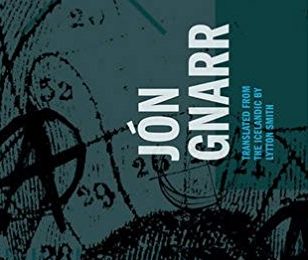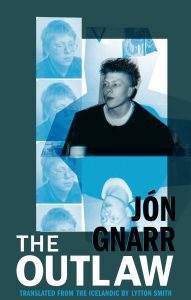

Jón Gnarr’s The Outlaw is a liftoff and a time machine, an anthemic yet singular coming-of-age story. Translated by Lytton Smith, the third and final volume in Gnarr’s autobiographical trilogy is a glimpse into a sensitive, often miserable teenage mind. Devastating candor pulls the reader into the emotional whirlpool of a young thinker as he grapples with normalcy, loneliness, his own limitations, and life’s unexpected possibilities.
A plane takes off from Reykjavík as the young narrator is flown to a remote “boarding school” called Núpur. The place is bleak, isolated, and desolate. There is nowhere to go, yet the windows are barred. Through nuanced clues—band t-shirts and the language of haircuts—readers are filled with adolescent trepidation. Who is likely to cause trouble? Are there any other punks like him? Were they sent here for their own good or because the world didn’t know what to do with them?
Anglophones abroad may know Gnarr more as a former mayor of Reykjavík than as a memoirist whose accounts of early trauma are reminiscent of Augusten Burroughs’ Running with Scissors. A long-time comedy star in Iceland, Gnarr reacted to the financial crisis by founding the satirical Best Party. His 2009 platform of irreverence, sincerity, and fun was built on a foundation of compassion and logic. Like his campaign, his writing draws humour out of suffering and empathy from the absurd. The trilogy is full of visceral strife—the human condition, compounded by misunderstandings of creativity and learning. Gnarr was diagnosed at an early age with mental retardation due to dyslexia, ADHD, and learning difficulties. The first book in the trilogy The Indian, (2006) recounts his years in a “home for retarded children,” as he experienced constant ridicule in “regular” schools. The title comes from a child watching Westerns, cheering for the Indians against cowboys. The Pirate (2009) continues the rejection of “the Man.” Still tormented at school, the outcast takes heart in punk rock ideas and attitude.
In The Outlaw, the kid from The Indian and The Pirate becomes an adult. The goal at Núpur is survival. Used to being the weird one, the narrator’s descriptions of social dynamics reveal a perception so accurate it is a liability. In a world of scarcity and violence, he wants to both fit in and be a rebel, to fly under the radar and carve out a niche. Despite being flagged as a troublemaker, he succeeds. The jokester, Jónsi Punk, experiences not schadenfreude, but relief at not being the subject of abuse, one of the only things Núpur has in stock. He has a brief place in the world.
The tentative sense of belonging doesn’t last in this book—perception and comprehension are not one and the same. The punk lyrics that Jónsi lives on praise uniqueness: “Be exactly who you want to be, do what you want to do/I am he and she is she but you’re the only you/No one else has got your eyes, can see the things you see/It’s up to you to change your life and my life’s up to me…” This is lifeblood to a kid trapped in a system he doesn’t understand. “I am the only Jónsi Punk in the world. There are many people like me, but no one exactly me.” There is power in this realization, but Jónsi doesn’t understand how to move through the ordinary world. Despite his constant fear of attack, he often doesn’t realize or care about the consequences—not to mention algebra, Danish grammar, or the progression of time. He doesn’t understand why he can’t grasp what appears to be easy for others, and there’s more to it than the conformism his punk idols rail against.
Jónsi is into trouble, but his stunts are recounted with thoughtful consideration: “Rules are established because people aren’t responsible and honest. If everyone was kind and good, conscientious and responsible, we’d have no rules….There’s no law about how to walk. No specific Walking Regulations…” He can’t take advantage of a girl, no matter how desperate he is for sexual experience. Sent home for insolence, he offers his mother a written commitment to behave, to be better. Her rebuke is not deliberately cruel—these parents want what’s best for their son and they are trying, themselves products of harsh life circumstances. The heart breaks in this unfiltered adolescent confusion. “Principles were clearly nonsense. What could I possible include in my life principles? To smoke less? To huff less?”
Astounding emotional impact comes from base impulses described matter-of-factly. What’s the relationship between harm and attention? What does a kid have to do to be able to fondle a girl’s breasts? The Outlaw highlights the constructed nature of “behavior” and “success.” So much is learned, and what happens to the ones who don’t learn? The question haunts the wings of this book.
In this novel, Gnarr has readers re-experience that be-all end-all teenage suspense and turmoil. He sneaks out, needs air; needs something. Taut anxiety takes over; everything depends on the next party and it always feels dangerous: “You never know what’s going to happen. You only know it will be fun. When evening came, we set off to paradise. The party was in Hnífsdalur. I gathered that this was a suburb of Ísafjörður, but it felt like a really odd name for a suburb: ’Valley of the Knives.’”
It seems Jónsi can’t help but live on the edge. When his peers move on to other schools and jobs, he remains trapped, floating between Reykjavík, Núpur, drugs, self-harm, and abandoned jobs. His indifference is punctuated by bursts of inspiration, torn between the desire to belong and the refusal to assimilate: “I wasn’t a slacker but a revolutionary worker. Slackers are parasites like the capitalist masters. In all the pictures I had seen, the workers were always cool.”
The Outlaw weighs the price not only of coolness, but genius. From an exploding whale to schoolmate bestiality, the prose and Smith’s translation are finely tuned—awful scenes are frankly described, never gratuitous. The terrible—rancid butter, curdled blood, vomit—is part of the truth.
When Jónsi discovers theatre midway through the book, readers wonder if he’s been saved. “I got bliss-chills from looking across the stage. I felt like someone who has always been lost and wild, but was now finally home.” The road only gets darker after that, though eventually Jónsi finds places to be and ways to be of service. We’re left with a final undoing, a liberation that feels abrupt, though perhaps there is always a moment when the dawn breaks. Ultimately, The Outlaw is a beacon, one person’s proof that we are always—and never—alone.
K.T. Billey’s debut collection Vulgar Mechanics is a finalist for Fordham Lincoln Center’s Poets Out Loud Prize. Stormwarning, Billey’s translation of the third book of poems by Icelandic poet Kristín Svava Tómasdóttir, is forthcoming from Phoneme Media in 2017. An Icelandic-Ukrainian Canadian originally from rural Alberta, Canada, Billey’s translations from Icelandic and Spanish have appeared in The Harvard Review, Circumference, and Palabras Errantes. She is also an educator, editor and literary critic.
Reviewed by K.T. Billey
The Outlaw
by Jón Gnarr, translated from the Icelandic by Lytton Smith
Publisher: Deep Vellum Publishing
Paperback / 312 pages / 2017
ISBN: 978-1-941920-52-7
To read more book reviews, please click here.
Published on May 2, 2017




